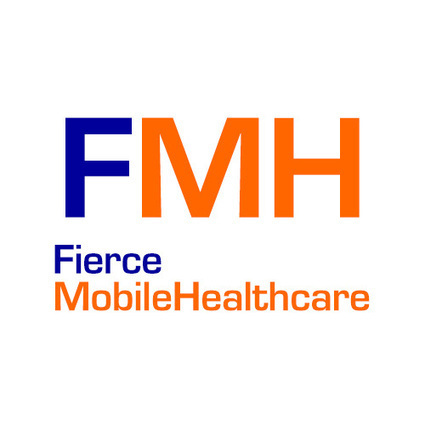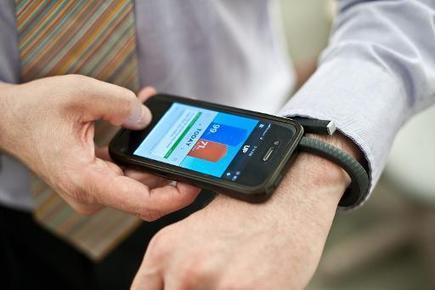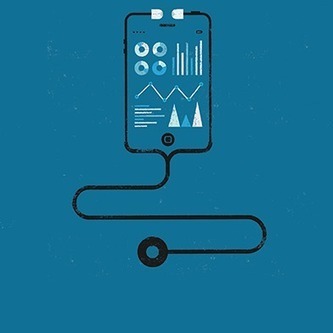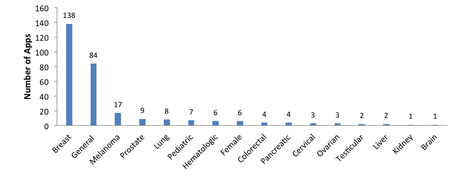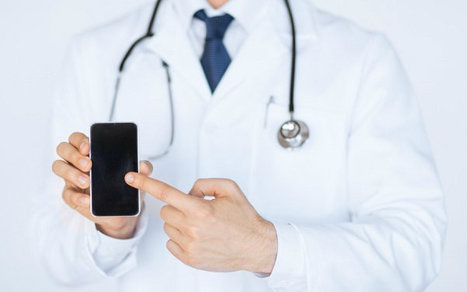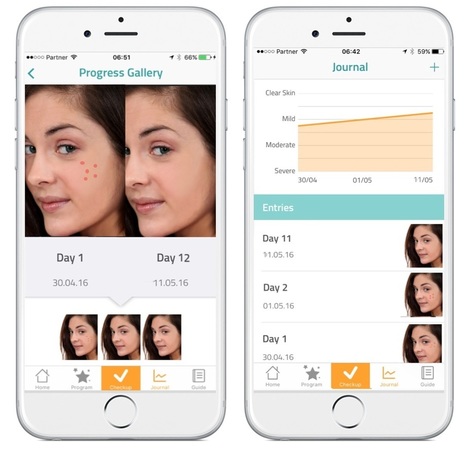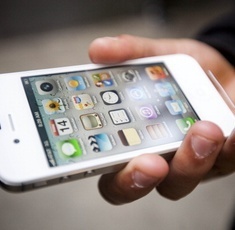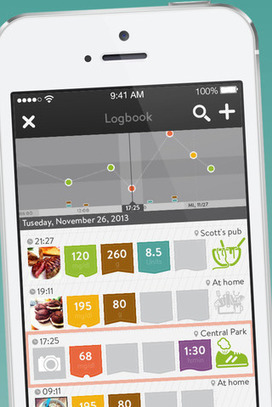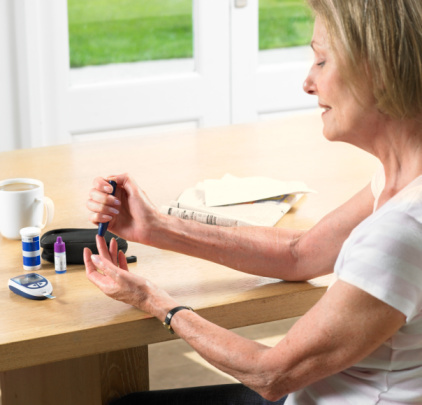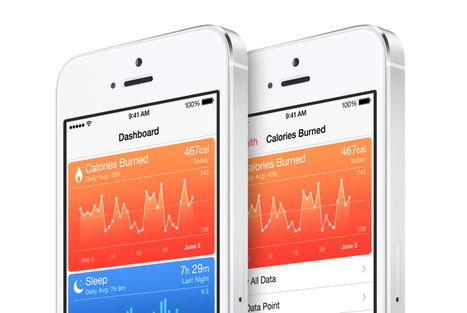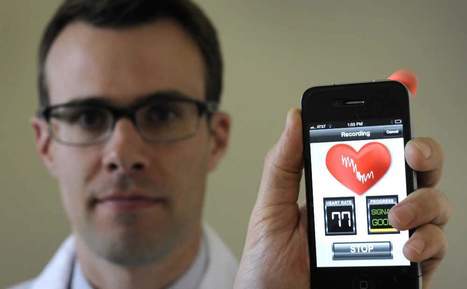 Your new post is loading...
 Your new post is loading...
Now that mHealth apps are flooding the market, clinicians and health systems must understand their benefits and detriments.
“Oh no! Not gestational diabetes again! As if I wasn’t busy enough with other things as it is. Now I will need to monitor my blood sugar levels and also keep a record of what I’m eating
After an initial diagnosis, diabetes sufferers often experience a period of shock when they learn that everything has to change. Turkish mobile operator, Turkcell, and agency R/GA London have created an app to make adjusting to the necessary life changes much easier. Instead of trying to persuade sufferers to adopt entirely new habits, tools and behaviors to monitor the condition, "healthmetre" deploys Instragram, a tool many people already use and taps into behaviors that people already have. R/GA designed healthmetre to be a more human way to manage diabetes and help patients develop new, more healthy habits in a way that feels natural and thereby, helping them reach a level of consistency. The idea is to make using the app as simple as possible, helping people stay motivated, complying with treatment and keeping the lines of communication with medical staff open. Diabetes is an increasing problem across the world and Turkey has been particularly affected. The most recent statistics (2014) from the International Diabetes Federation show that Turkey has the highest rate of the illness in Europe, with an incidence of 14.7%, much higher than countries like, for example, the U.K. (5.4%) or mid-ranked Germany (7.9%). The results of the 18-month trial are highly encouraging. Treatment compliance increased by 54%. Blood sugar levels decreased by 27% and complication forecasts decreased by 37%.
more at http://www.fastcocreate.com/3047389/a-new-app-to-make-life-easier-for-diabetics-using-instagram
Via nrip, Rémy TESTON
Today's mobile apps are helping diabetics aggregate blood sugar and nutritional data from multiple platforms and devices and logging data into central portals accessible anywhere, according to Steve Robinson, general manager of the Cloud Platform Services Division for IBM.
The apps and snap-on smartphone monitoring devices are letting physicians integrate biometric data from wearables into patient data and analyze patient data at fast speed, Robinson writes at InformationWeek. The benefits are just as extensive as the functionality being developed, he says The gains include everything from simplifying records and improving doctor-patient conversations to gaining a holistic view of a diabetic's health. Doctors can "crunch and analyze patient data at rapid speeds to help identify patterns and predict future health and treatment needs," he writes. "Mobile apps can help diabetes sufferers get ahead of their symptoms and live healthier, more carefree lives," Robinson says. eBrief | Advice for Healthcare Organizations Seeking to Centralize Patient Records, Decommission Legacy Systems Health systems are transforming their foundations and infrastructures to cut costs and improve care. In this eBook, hospital leaders share challenges and tools to make systemwide decisions that can help boost quality care and outcomes. Download today! Sign up for our FREE newsletter for more news like this sent to your inbox! Diabetes tools have ranged from providing smartphone coaching that is helping diabetics living in low to modest socioeconomic communities manage their disease and improving their health, to a wearable, automated bionic pancreas for continuous glucose monitor and a software algorithm, according to a study at the New England Journal of Medicine. In addition, mobile monitoring of diabetic employees can save more than $3,000 a year in healthcare costs, half of the average annual medical insurance cost for workers diagnosed with diabetes. Today's tools and cloud-based capabilities are reducing those costs while also driving innovation for disease management, Robinson says. "Using cloud services, combined with the ease and convenience of mobile, new methods of managing this disease are being brought to patients around the world," he writes.
For more information:
- read the article Related Articles:
Mobile monitoring tools can cut diabetes management costs in half
Smartphone-powered bionic pancreas outperforms traditional diabetes pump
Smartphone coaching can boost diabetic management, help reduce disease risks
Smartphone app aims for faster, more accurate, body fluid testing
Smartphones may be the next-gen blood test laboratory
Montefiore explores texting for diabetic teens, pre-op care
Via Celine Sportisse, DIRECT MEDICA by Webhelp, dbtmobile, Giuseppe Fattori, eMedToday
Your smartphone is not only your best friend, it's also become your personal trainer, coach, medical lab and maybe even your doctor.
"Digital health" has become a key focus for the technology industry, from modest startups' focus on apps to the biggest companies in the sector seeking to find ways to address key issues of health and wellness.
Apps that measure heart rate, blood pressure, glucose and other bodily functions are multiplying, while Google, Apple and Samsung have launched platforms that make it easier to integrate medical and health services.
"We've gotten to a point where with sensors either in the phone or wearables gather information that we couldn't do in the past without going to a medical center," says Gerry Purdy, analyst at Compass Intelligence.
"You can do the heart rate, mobile EKGs (electrocardiograms). Costs are coming down, and these sensors are becoming more socially acceptable."
The consultancy Rock Health estimates 143 digital health companies raised $2.3 billion in the first six months of 2014, already topping last year's amount.
Recent studies suggest that people who use connected devices to monitor health and fitness often do a better job of managing and preventing health problems.
A study led by the Center for Connected Health found that people who use mobile devices did a better job of lowering dangerous blood pressure and blood sugar levels.
A separate study published in the July 2014 issue of Health Affairs found that data collected by devices is not only useful for patients but can help doctors find better treatments.
"When linked to the rest of the available electronic data, patient-generated health data completes the big data picture of real people's needs, life beyond the health care system," said Amy Abernethy, a Duke University professor of medicine lead author of the study.
Some firms have even more ambitious plans for health technology.
Google, for example, is developing a connecting contract lens which can help monitor diabetics and has set up a new company called Calico to focus on health and well-being, hinting at cooperation with rivals such as Apple. And IBM is using its Watson supercomputer for medical purposes including finding the right cancer treatment.
Read more at: http://phys.org/news/2014-07-mobile-tech-reshaping-health-sector.html#jCp
Via nrip
After decades as a technological laggard, medicine has entered its data age. Mobile technologies, sensors, genome sequencing, and advances in analytic software now make it possible to capture vast amounts of information about our individual makeup and the environment around us. The sum of this information could transform medicine, turning a field aimed at treating the average patient into one that’s customized to each person while shifting more control and responsibility from doctors to patients.
The question is: can big data make health care better?
“There is a lot of data being gathered. That’s not enough,” says Ed Martin, interim director of the Information Services Unit at the University of California San Francisco School of Medicine. “It’s really about coming up with applications that make data actionable.”
The business opportunity in making sense of that data—potentially $300 billion to $450 billion a year, according to consultants McKinsey & Company—is driving well-established companies like Apple, Qualcomm, and IBM to invest in technologies from data-capturing smartphone apps to billion-dollar analytical systems. It’s feeding the rising enthusiasm for startups as well.
Venture capital firms like Greylock Partners and Kleiner Perkins Caufield & Byers, as well as the corporate venture funds of Google, Samsung, Merck, and others, have invested more than $3 billion in health-care information technology since the beginning of 2013—a rapid acceleration from previous years, according to data from Mercom Capital Group.
Via nrip
Since the beginning of the 21st century, mobile phones have become nearly ubiquitous. At the end of 2011, there were an estimated 6 billion mobile subscriptions, accounting for approximately 87% of the global population
Rapid technological convergence has led to the emergence of smartphones—feature-rich phones that combine the voice and text messaging functions of basic phones with powerful computing technology that can support third-party applications, sensing, Internet access, and wireless connectivity with other devices.
According to a 2012 report from the Pew Internet and American Life Project, 85% of US adults own a cell phone of some kind and 53% own a smartphone
The combination of their popularity, technical capabilities, and proximity to their owners makes them an attractive platform for the delivery of health promotion and disease management interventions
Systematic review methodology, as described by Moher et al , was used to guide the collection and characterization of eligible apps from the official smartphone stores and the evidence on app utility or effectiveness from the health literature. We developed a systematic search strategy that attempted to identify all relevant apps and studies and we provide a systematic presentation and synthesis of the characteristics of the apps and the studies.
RESULTS:
The search of the mobile phone market yielded 1314 potentially relevant apps, of which 309 apps met our selection criteria (Figure 1); 90.3% (279/309) of apps were available on the iPhone or Android markets . Twelve apps were available on more than one platform (10 were available in two stores and 2 in three stores). Therefore, there were a total of 295 unique apps.
Release date information was available for only 38.0% (112/295) of the apps from Apple, Android, and BlackBerry, as the remainder had produced updated versions and only published their date of update. Release date information was not available for apps on the Nokia market.
Half of the apps (50.2%, 148/295) were free to download. Of those free-to-download apps, 8 were trial versions of the full pay-for-download applications. These free apps offered limited versions of the full apps, restricting access to the full suite of features.
The majority of the apps did not describe their organizational affiliation (64.1%, 189/295). Of those that provided organizational information, 63.2% (67/106) were affiliated with a non-profit, 26.4% (28/106) with a commercial company (eg, Health Monitor Network), 9.4% (10/106) with a university or medical institution, and 1 app was affiliated with a government institution (eg, National Institutes for Health).
Apps affiliated with not-for-profit organizations (non-profit, university, medical institution, or government) were more likely to be free (?21=16.3, P<.001). Apps that did not disclose their affiliation were more likely to have a price (?21=50.1, P<.001).
full article with details at http://www.jmir.org/2013/12/e287/
Via nrip
|
A new study found that SMS polls can help rapidly gather health information.
As part of a recent study on mobile technology, when a user told Cortana that he/she wanted to commit suicide, the program redirected the user to a web search page while Siri replied with information from a National suicide hotline. S-Voice offered some human touch and responded “I want you to be OK, please talk to me,” but didn’t offer any other outside help. To questions with respect to depression, these programs only responded with “I’m sorry to hear that” and “It breaks my heart to hear that.” In this study conducted by Northwestern University, Stanford University and the University of California-San Francisco, researchers surveyed the responses of Google Now, Apple’s Siri, Microsoft’s Cortana, and Samsung’s S Voice to assess questions related to mental health issues or abuse. The results were incomplete and inconsistent responses from these conversational agents. Though most of the people rely on Smartphones to access their health data or information about medical conditions, addressing mental health issues through mobile technology hasn’t made much headway. This study in itself is enough to suggest that tech companies as well as the healthcare sector need to ramp-up their efforts to research about mobile tools for addressing mental health issues. Researchers from the University of Manchester and Lancaster University said that “Previous research has indicated that interventions delivered in this format are acceptable for people with Serious Mental Illness (SMI). However, a comprehensive systematic review is needed to investigate the acceptability of online and mobile phone-delivered interventions for SMI in depth”. Mobile apps are increasingly being used to track social interaction, moods, human behavior and speech & voice levels to help people suffering from mental issues. These apps can help to reduce instance of negative behavior and can be used as an alternative treatment method for people affected by depression and anxiety. Naturally, experts believe that these apps should be backed by clinical evidence to ensure effectiveness before release to consumers. During the trial of a cognitive behavioral therapy app, Catch It, conducted by the University of Liverpool’s Institute of Psychology, Health and Society, the University of Liverpool’s Computer Services and the University of Manchester’s School of Psychological Science, researchers found a significant reduction in negative behavior amongst 285 participants in six weeks. One of the report’s authors, Professor Peter Kinderman, said “This type of therapy cannot remove problems, but it can help people deal with them in a more positive way. It is based on the concept that your thoughts, feelings, physical sensations and actions are interconnected, and that negative thoughts and feelings can trap you in a vicious cycle,” What concerns experts is the limited attention span of patients when using mobile technology to treat mental health issues. The key to improving these patients condition is to keep them engaged throughout the process and, a mobile tool might lack in that area due to the absence of human interaction. To be completely effective, patients would need to use these tools regularly on their own. Unfortunately, technology makes us impatient and shortens our attention spans. Moreover, Users of mobile health apps discontinue its usage after sometime of download confirming the low engagement level of most of the health apps. To successfully treat mental health issues, the Healthcare sector would need to come out with engaging mobile solutions that make patients come back again and again for improved way of thinking to alter their behavioral patterns. While a human touch would still be required, because essentially mental health issues occur as a result of human relationships only, Smartphone apps can serve as a mode to gather passive data for mental health professionals who are unable to track their patients’ behavior. One way or other, mobile technology is expected to play a significant role in the mental health segment.
FDA said it will ease up vetting general health and wellness apps, but it will scrutinize clinical applications and devices. Does this mean the FTC will step up? The U.S. Food and Drug Administration has issued final guidance on “low-risk” digital health apps and devices for general health management 18 months after it came out with draft guidance. The document offers information on the kinds of apps and devices for which it will and won’t take action. Apps promoting or maintaining a healthy weight or to assist with weight loss goals and healthy eating are OK. The guidance says that companies can make claims that their apps and devices can help with healthy lifestyle choices to reduce the risk of chronic conditions such as Type 2 diabetes, high blood pressure and heart disease or improve their management. But those lifestyle choices have to be advocated by the likes of the American Heart Association or American Association of Clinical Endocrinologist or peer-reviewed medical journals. So what are some examples of what’s not OK? Claims that a product will treat or diagnose obesity, an eating disorder, such as bullimia or anorexia, or an anxiety disorder. Digital health entrepreneurs are also encouraged to ask themselves the following questions: Is the product invasive?
Is the product implanted?
Does the product involve an intervention or technology that may pose a risk to
the safety of users and other persons if specific regulatory controls are not applied, such as risks from lasers or radiation exposure? If the answer is yes to any of the above, they need to assume their products are considered clinical applications, will be scrutinized and should act accordingly. My takeaway from the guidance is twofold. It’s a question of resources. Although there are thousands of general wellness apps, more and more medical device and pharma companies are developing digital health devices and apps of their own. Second, the Federal Trade Commission has shown it is willing to take action against companies that it deems to be making false health claims about their apps and devices.
Via rob halkes
The market of mobile health (mHealth) apps has rapidly evolved in the past decade. With more than 100,000 mHealth apps currently available, there is no centralized resource that collects information on these health-related apps for researchers in this field to effectively evaluate the strength and weakness of these apps. Objective The objective of this study was to create a centralized mHealth app repository. We expect the analysis of information in this repository to provide insights for future mHealth research developments. Methods We focused on apps from the two most established app stores, the Apple App Store and the Google Play Store. We extracted detailed information of each health-related app from these two app stores via our python crawling program, and then stored the information in both a user-friendly array format and a standard JavaScript Object Notation (JSON) format. Results We have developed a centralized resource that provides detailed information of more than 60,000 health-related apps from the Apple App Store and the Google Play Store. Using this information resource, we analyzed thousands of apps systematically and provide an overview of the trends for mHealth apps. Conclusions This unique database allows the meta-analysis of health-related apps and provides guidance for research designs of future apps in the mHealth field.
Via nrip
Journal of Diabetes Science and Technology, Vol. 7, Issue 1 Jan. 2013. El-Gayar, Timsina and Nawar.
ABSTRACT
Background:
Advancements in smartphone technology coupled with the proliferation of data connectivity has resulted in increased interest and unprecedented growth in mobile applications for diabetes self-management. The objective of this article is to determine, in a systematic review, whether diabetes applications have been helping patients with type 1 or type 2 diabetes self-manage their condition and to identify issues necessary for large-scale adoption of such interventions.
Methods:
The review covers commercial applications available on the Apple App Store (as a representative of commercially available applications) and articles published in relevant databases covering a period fromJanuary 1995 to August 2012. The review included all applications supporting any diabetes self-management task where the patient is the primary actor.
Results:
Available applications support self-management tasks such as physical exercise, insulin dosage or medication, blood glucose testing, and diet. Other support tasks considered include decision support, notification/alert, tagging of input data, and integration with social media. The review points to the potential for mobile applications to have a positive impact on diabetes self-management. Analysis indicates that application usage is associated with improved attitudes favorable to diabetes self-management. Limitations of the applications include lack of personalized feedback; usability issues, particularly the ease of data entry; and integration with patients and electronic health records.
Conclusions:
Research into the adoption and use of user-centered and sociotechnical design principles is needed to improve usability, perceived usefulness, and, ultimately, adoption of the technology. Proliferation and efficacy of interventions involving mobile applications will benefit from a holistic approach that takes into account patients’ expectations and providers’ needs.
J Diabetes Sci Technol 2013;7(1):247–262
Via rob halkes
The Food and Drug Administration (FDA), which regulates everything from heart monitors to horse vaccines, will soon have its hands full with consumer health apps and devices. The vast majority of the health apps you’ll find in Apple’s or Google’s app stores are harmless, like step counters and heart beat monitors. They’re non-clinical, non-actionable, and informational or motivational in nature. But the next wave of biometric devices and apps might go further, measuring things like real-time blood pressure, blood glucose, and oxygen levels. More clinical apps The FDA is charged with keeping watch on the safety and efficacy of consumer health products. Lately, that includes more clinical apps as well as devices you might buy at the drugstore, like a home glucose testing kit. “It’s these apps that the FDA says it will regulate,” David Bates of Brigham and Women’s Hospital and Physicians Organization told VentureBeat in June. These apps will have to go through the full 510(k) process,” he said. Dr. Bates chaired a group to advise the FDA on how to review health apps for approval, and on how the FDA should advise developers. “It was intended to help them think through the risk factors involved with these products and then give guidance on how to stay within the guidelines,” he said. “The device makers were asking from some guidance from The FDA on what types of things would be accepted and what wouldn’t,” Bates said. Bates believes the FDA wants to use a light regulatory touch when looking at new medical devices. “The FDA definitely wants innovation to continue in clinical devices,” he said. “In general the FDA knows that the vast majority of apps are just informational.” The FDA’s final guidance focuses on a small subset of mobile apps that present a greater risk to patients if they do not work as intended. Health apps go mainstream The big software companies (Apple, Google, and Samsung) have brought attention to, and lent credibility to, apps and devices that do more than count steps. These companies are building large cloud platforms designed to collect health data from all sorts of health apps and devices. more at http://venturebeat.com/2014/07/21/health-apps-are-changing-so-must-the-fda/
Via nrip, Clara Hamelin
The medical industry is quickly adopting mobile technology as a means of connecting lay users with medical professionals. Increasingly, smartphone and tablet users are speaking to their doctors, scheduling medical appointments, and even receiving complex diagnoses via mHealth platforms.
mHealth makes it possible for consumers to receive personalized medical care that may otherwise be unavailable to these individuals.
In this article you can find cases that include some of the most successful mHealth developments to date.
Via nrip
Take Home: UMass Medical School and WPI have developed an app that can detect atrial fibrillation. This moves connected and mobile health closer to reality. The really important development with this approch might allow us to treat patients who have AF intermittently (paroxysmal) differently than we currently do. Because we are worried about stroke, patietns now get blood thinners all the time because we are concerned that they will have recurrences without knowing about it. With this technology, in the future, we might see validation of a strategy that allows use of blood thinners when patients are in AF only, sometimes called a pill in the pocket.
Via Seth Bilazarian, MD, Lionel Reichardt / le Pharmageek
|



 Your new post is loading...
Your new post is loading...







